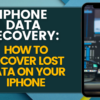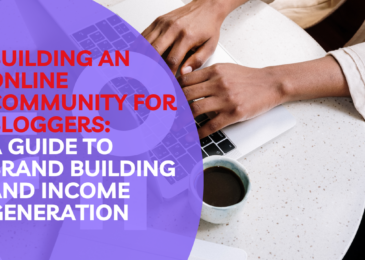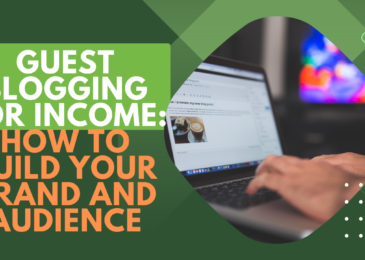Over the past few years, podcasting has emerged as a dynamic medium that allows bloggers to connect with their audience in a highly personalized and interactive manner. It presents an exceptional opportunity to communicate expertise, narratives, and perspectives through the power of audio content.
For bloggers seeking to broaden their reach and monetize their endeavors, venturing into the realm of podcasting can be a transformative experience. In this article, we will provide you with a comprehensive guide on how to create and monetize a successful podcast.
Choosing Your Podcast Topic and Format
- Define your target audience: Prior to launching your podcast, it is crucial to gain a deep understanding of your ideal listeners. Take into account the interests, demographics, and preferences of your blog readers, and customize your podcast content to cater to their specific needs.
- Choose a captivating topic: Opt for a podcast topic that aligns with the niche of your blog and resonates with your audience. Seek out a distinctive angle or perspective that distinguishes your podcast from others within the same genre.
- Determine the format: Decide whether your podcast will take the form of a solo show, an interview-based format, or a combination of both. Embrace experimentation with different formats to ascertain the optimal approach for engaging your audience effectively.
Planning and Recording Your Podcast
- Outline your episodes: Create a rough outline or script for each episode to ensure a clear flow of content. This will help you stay organized and focused during recording.
- Invest in quality recording equipment: While you don’t need expensive equipment to start, investing in a good microphone and headphones can significantly improve the audio quality of your podcast.
- Find a quiet recording space: Choose a quiet location with minimal background noise to record your episodes. Consider using soundproofing techniques or recording during times when there is less external noise.
- Edit and enhance your recordings: Use audio editing software to clean up your recordings, remove any mistakes or awkward pauses, and add intro/outro music or sound effects. This step is crucial for creating a polished final product.
Publishing and Promoting Your Podcast
- Choose a podcast hosting platform: Select a reliable podcast hosting platform that will distribute your episodes to various podcast directories, such as Apple Podcasts, Spotify, and Google Podcasts. Some popular hosting platforms include Libsyn, Podbean, and Anchor.
- Create eye-catching podcast artwork: Design visually appealing cover art that represents your podcast’s branding and attracts potential listeners. Consider hiring a professional graphic designer or using online tools like Canva to create high-quality artwork.
- Write compelling episode titles and descriptions: Craft attention-grabbing titles and concise episode descriptions that entice listeners to click and listen to your episodes. Use relevant keywords to improve your podcast’s discoverability in search results.
- Maximize the visibility of your podcast by leveraging your blog and social media platforms: Utilize your existing readership on the blog and followers on social media to promote your podcast. Generate interest and attract traffic to your podcast by sharing enticing teaser clips, highlighting episodes, and providing behind-the-scenes content.
Monetizing Your Podcast
- Sponsorships and advertisements: Once you have built a significant listenership, you can explore sponsorship opportunities or display advertisements in your podcast episodes. Connect with brands that align with your podcast’s niche and audience to secure mutually beneficial partnerships.
- Affiliate marketing: Recommend products or services related to your podcast’s topic and include affiliate links in your show notes. When listeners make a purchase through your links, you earn a commission, providing an additional stream of income.
- Premium content and memberships: Offer exclusive bonus episodes, behind-the-scenes content, or access to a membership community for a fee. This allows your most dedicated fans to support your work while receiving extra value in return.
- Crowdfunding: Consider launching a crowdfunding campaign on platforms like Patreon or Kickstarter. Offer special perks, such as early access to episodes or personalized shout-outs, to those who contribute to your campaign. This can provide ongoing financial support from your loyal audience.
- Product or service creation: Leverage your podcast’s popularity to create and sell your own products or services. For example, you could develop an online course, write an ebook, or offer consulting services related to your podcast’s topic.
- Live events and sponsorships: Organize live events or workshops related to your podcast and sell tickets or secure sponsorships from relevant brands. These events can provide an immersive experience for your audience while generating revenue.
Engaging with Your Podcast Audience
- Encourage listener interaction: Invite your audience to submit questions, topic suggestions, or feedback. Read and respond to listener emails or comments on social media to foster a sense of community and connection.
- Invite guest contributors: Collaborate with other bloggers, industry experts, or influencers by inviting them as guest contributors on your podcast. This not only brings fresh perspectives to your show but also expands your reach through cross-promotion.
- Consistency is key: Publish new episodes on a consistent schedule to keep your audience engaged and coming back for more. Whether it’s weekly, biweekly, or monthly, establish a rhythm that works for you and stick to it.
Also read:
SEO for Bloggers: Best Practices for Optimizing Your Content
Building an Email List for Bloggers: How to Drive Traffic and Generate Income
Sponsored Posts and Advertising: A Blogger’s Guide to Working with Brands
Creating and Selling Digital Products: A Guide to Monetizing Your Blog
FAQs
Do I need to have a large audience or following to start a podcast?
While having an existing audience can be beneficial, it is not a requirement to start a podcast. Podcasting can also help you reach and build a new audience. Focus on creating quality content and promoting your podcast effectively to attract listeners.
What is the recommended duration for each episode?
The optimal length of an episode varies depending on your content and target audience. Typically, it is suggested to keep episodes within the range of 20 minutes to an hour. However, if your content is compelling and provides value, listeners are more likely to remain engaged regardless of the episode’s length.
What if I don’t have much technical knowledge or experience with recording and editing audio?
You don’t need to be a technical expert to start a podcast. There are user-friendly tools and resources available that can guide you through the process. Additionally, you can outsource tasks like editing to professionals if you prefer.
How do I attract sponsors for my podcast?
To attract sponsors, focus on growing your listenership and engagement. Once you have a significant audience, reach out to brands that align with your podcast’s niche and target audience. Highlight the value you can offer to their brand and the potential reach of your podcast.
How soon can I start monetizing my podcast?
Monetizing your podcast typically takes time and consistency. It’s important to focus on building a loyal and engaged audience first. Once you have a solid listenership, you can explore monetization options such as sponsorships, affiliate marketing, or premium content.
How can I measure the success of my podcast?
Success can be measured in various ways, including the number of downloads and listens, audience engagement, feedback and reviews, and revenue generated. Set goals for yourself and track your progress over time to gauge the success of your podcast.
Can I repurpose my blog content for my podcast?
Absolutely! Repurposing your existing blog content can be a great way to create podcast episodes. However, be mindful of adapting the content to suit the audio format and make it engaging for listeners. Consider adding new insights or expanding on the topics discussed in your blog posts.
How can I keep my podcast engaging and retain listeners?
To keep your podcast engaging, focus on delivering valuable content, storytelling, and incorporating listener interaction. Use a conversational tone, share personal anecdotes, and invite guests to bring fresh perspectives. Consistency and regular updates will also help retain listeners.
Conclusion
Podcasting offers bloggers a fantastic opportunity to connect with their audience on a deeper level and monetize their efforts. By choosing a compelling topic, planning and recording your episodes effectively, promoting your podcast across various channels, and implementing smart monetization strategies, you can create a successful podcast that generates both income and engagement. Remember, building a podcast takes time and effort, but with dedication and consistency, you can leverage this powerful medium to expand your reach, grow your brand, and connect with a wider audience.






